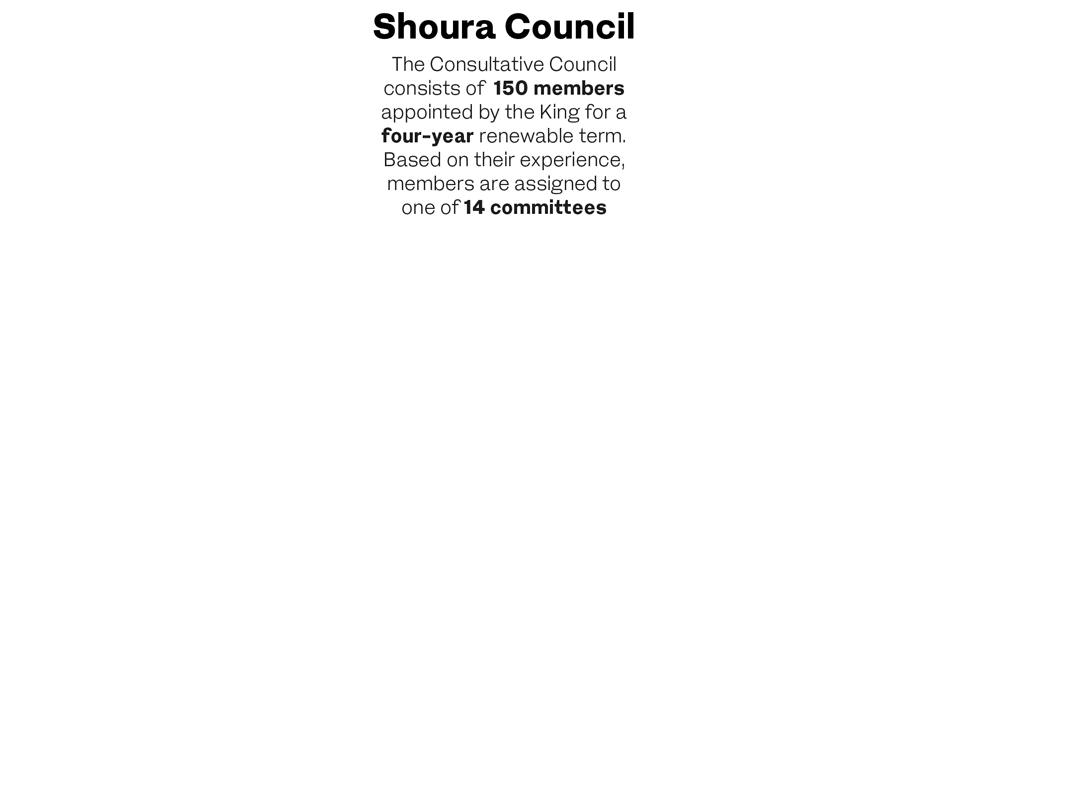JEDDAH: When King Salman gives his annual speech that will open the third year of the Shoura Council’s seventh session today, it will set the tone for what lies ahead for the Kingdom, laying the groundwork for the consultative assembly to help to move the country forward.
“The King’s speech in the Shoura Council lays the road map to achieving Vision 2030,” said Lina Almaeena, one of its 30 female members. Women make up of 20 percent of the council, the same percentage of women who now hold seats in the US Congress.
While only midway through its seventh session, the roots of the Shoura Council date back to before Saudi Arabia’s founding. After entering the city of Makkah in 1924, King Abdul Aziz Al-Saud entrusted the council with drafting the basic laws for the administration of what was to become the future unified Kingdom.
In 1928, amendments were made as public interest grew. A new law consisting of 24 articles, which included the permanent appointment of a vice-president by the King, was issued to facilitate the council’s work.
In 1953, the council’s jurisdictions were distributed between the Council of Ministers and other government entities, reducing the Shoura Council’s power, although it continued to hold sessions until its mandate was once again broadened this century.
Its current format consists of a Speaker and 150 council members, among them scholars, educators, specialists and prominent members of society with expertise in their respective fields, chosen by the King and serving a four-year term.
The council convenes its sessions in the capital of Riyadh, as well as in other locations in the Kingdom as the King deems appropriate. Known as Majlis Al-Shoura inside the Kingdom, its basic function is to draft and issue laws approved by the King, as the cabinet cannot pass or enforce laws, a power reserved for the King to this day.
The Shoura can be defined as an exchange of opinions, and so another of its functions is to express views on matters of public interest and investigate these issues with people of authority and expertise, hence the 14 specialized committees that cover several aspects of social and governmental entities. From education, to foreign affairs, members assigned to committees review proposed draft laws prior to submitting them to the King, as they are able to exercise power within its jurisdiction and seek expertise from non-Majlis members. All requested documents and data in possession of government ministries and agencies must go through a request process from the Speaker to facilitate the Shoura Council committees’ work.
Female members are a fairly recent phenomenon. In September 2011, the late King Abdullah stated that women would become members of the council. In 2013, two royal decrees reconstituted the council, mandating that women should always hold at least a fifth of its 150 seats and appointed the first group of 30 female Shoura members.
Five years on, female Shoura Council members have played a major role in raising their voices over many issues concerning social development in Saudi Arabia. “It’s a golden age for Saudis and, as women, we’ve come a long way,” said Almaeena. “We’re living an era of historical change, and we’re making up for lost time.”
As part of their roles, members of the council have the right to discuss general plans for economic and social development, particularly now with the Vision 2030 blueprint. Annual reports forwarded by ministries and governmental institutes, international treaties and concessions are also within the council members’ remit, to discuss and make suggestions that are deemed appropriate.
“Many positive changes have taken place in the past few years, and the Shoura Council’s role has always put social developments first and foremost,” said Dr. Sami Zaidan, a council member of two terms. “The appointment of women diversified and expanded the discussions and has added value.”
Major achievements were chalked up in this term’s second year. Many of the draft proposals discussed received approval votes. On Nov. 8, a proposal with 39 articles to protect informants from attacks, threats and material harm was approved by the majority of the council. The draft law, suggested by the Ministry of Interior and the Ministry of Economy and Planning, would provide whistle-blowers with protection.
In May, the Shoura Council also approved legislation criminalizing sexual harassment in the Kingdom. The Cabinet, chaired by King Salman, backed the legislation, which required a royal decree to become law. Under it, perpetrators may face a jail sentence of up to five years and a SR 300,000 fine.
Draft regulations must go through a two-step process. The first, a chairman of a committee reads a draft of a proposal on the floor, and council members vote on referring the proposal to the designated committee. If members agree to the referral, each article is discussed thoroughly, studies are conducted on the aspects of the proposal, and after completing all the necessary checks, it reaches the second stage. The council then discusses the committee’s recommendations and a vote is set for each article proposed in an earlier session by the committee’s chairman.
Other proposals on the discussion table for this session include one that recognizes the importance of voluntary work in the community, in compliance with Vision 2030, which talks about one million volunteers in the Kingdom by 2030. The council has also asked the General Sports Authority to speed up the development of sports cities and to diversify its functions in different parts of the Kingdom to help the organizational level of women’s sports become an independent agency affiliated to the GSA chairman.
The council has also discussed a recommendation for women to hold leadership positions in Saudi Arabia’s diplomatic missions abroad, from a report by the council’s Foreign Affairs Committee. With approximately 130 women working at the Ministry of Foreign Affairs, the report recommended the necessity of an appointment as an affirmation that Saudi women are able to take over leadership positions as ministers, ambassadors and Saudi representatives in international forums.
Almaeena pointed out that Shoura Council members are the ears of society, playing an important role in relaying the public’s message to the designated committees. “The Shoura Council’s doors are always open, although not many know this,” she said. “The public is always welcome and can attend sessions, scheduling ahead of time. The doors to the council have always been and will always be open to all.”































